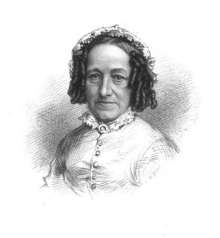Mathilde von der Recke-Volmerstein

Mathilde Charlotte Juli Countess von der Recke-Volmerstein (born July 28, 1801 in Pilgramsdorf in Silesia , † May 5, 1867 in Kraschnitz , Silesia) was a pioneer of early German awakening diakonia .
Life
Countess Mathilde was the third of ten children of Count Friedrich Ludwig von Pfeil and Klein-Ellguth (1769–1844) and his wife Emilie Beate, b. Countess von Reichenbach-Goschütz (1773–1855). Since 1807 she grew up on Gut Kleutsch and from 1812 to 1820 attended the girls' school in Gnadenfrei (near Reichenbach in the Owl Mountains ). Here she was shaped for her entire life by the piety of the Moravian Brethren . In 1820 she went on an educational trip to Switzerland with her father, during which she attended the Johann Heinrich Pestalozzis Educational Institute in Yverdongot to know. She then lived on her parents' estate, Wildschütz, and gathered a group of like-minded people who supported the awakening movement , including the rescue center operated by Count Adalbert von der Recke-Volmerstein, first at Haus Overdyck and from 1822 in Düsseltal . The count, who came from the Westphalian noble family Recke , visited the family at Gut Wildschütz in 1825 and proposed marriage to them a year later, as he saw her as a suitable housemother for his orphanage. After the wedding on October 16, 1826, the Countess took over her duties in Düsselthal in July 1827. Thanks to their commitment to an education suitable for children and an improvement in the medical and hygienic conditions, the rescue house soon became a model institution, which, among others, visited Crown Prince Friedrich Wilhelm of Prussia in 1833. Under the guidance of Karl Julius Aegidi (1794–1874), who worked as a general practitioner in the rescue house, the countess herself familiarized herself with the very young teaching of homeopathy .
Since her husband was sick again and again, she soon bore the main responsibility for the finances and staff of the rescue facility. In November 1847, the count couple were able to hand over the management of the facility to the Moers pedagogue Christian Friedrich Georgi and move to Gut Kraschnitz in Silesia. There she was involved in further founding of her husband, but mainly occupied with the administration of the estate and the upbringing of a total of ten children.
In Düsseldorf-Düsseltal , Mathildenstrasse (across from Graf-Recke-Strasse, named after her husband) bears her name. The diaconal institution was relocated to Düsseldorf-Wittlaer from 1902 and exists today as the Graf Recke Foundation .
Fonts
-
Memories from the life of Countess Mathilde von der Recke-Volmerstein, b. Countess von Pfeil and Klein-Ellguth. Dame des Louisenordens, II, 1. Dülfer, Breslau 1873 (published posthumously by her daughter Maria de Hanbury).
- Recollections of the life of countess Matilda von der Recke Volmerstein, by her daughter. London 1874 ( Google Books ).
literature
- Mary Pryor: Consecrated women, by 'Claudia'. London 1880 pp. 171-184 (biography, English).
- Gerlinde quarter: Mathilde Countess von der Recke-Volmerstein born. Countess von Pfeil and Klein-Ellguth (1801–1867). In: Monthly Issues for Protestant Church History of the Rhineland 51, 2002, pp. 187–216.
- Gerlinde quarter: Countess Mathilde von der Recke-Volmerstein (1801–1867). In: Adelheid M. von Hauff (ed.): Women shape diakonia. Volume 2: From the 18th to the 20th century. Kohlhammer, Stuttgart 2006, pp. 164-180.
- Manfred Berger: Recke-Volmerstein, Mathilde Charlotte July Countess of the. In: Biographisch-Bibliographisches Kirchenlexikon (BBKL). Volume 29, Bautz, Nordhausen 2008, ISBN 978-3-88309-452-6 , Sp. 1137-1150.
Individual evidence
- ^ Heinz Eppenich: History of the German homeopathic hospitals. From the beginning to the end of the First World War. Haug, Heidelberg 1995, pp. 154-157. The report spread by Aegidi that he had founded the first homeopathic sanatorium in Germany in Düsseltal, is debunked by Eppenich as a myth.
- ↑ Lin, Tsong-minn: Das Düsselthaler teacher seminar and Christian Friedrich Georgi: Teacher training an d. Düsselthaler rescue facility. Dissertation University of Frankfurt a. Main 1987
- ↑ https://www.phil-fak.uni-duesseldorf.de/frauenarchiv/ddorf/strassen/matilde.html Website women's history in Düsseldorfer street names , accessed on November 17, 2016.
Web links
- Gerlinde quarter: Countess Mathilde von der Recke Volmerstein (1801-1867); In: Adelheid M. von Hauff (Ed.): Women design Diakonie, Volume 2, Stuttgart 2006, p. 164 Google Books
- Short biography with artistic portrait Retrieved on August 1, 2018 from www.duesseldorf.de.
| personal data | |
|---|---|
| SURNAME | Recke-Volmerstein, Mathilde von der |
| ALTERNATIVE NAMES | Recke-Volmerstein, Mathilde Charlotte Juli Countess von der (full name); Pfeil and Klein-Ellguth, Mathilde Charlotte Juli Countess von der (maiden name) |
| BRIEF DESCRIPTION | Pioneer of early German revival diakonia |
| DATE OF BIRTH | July 28, 1801 |
| PLACE OF BIRTH | Pilgramsdorf , Silesia |
| DATE OF DEATH | May 5, 1867 |
| Place of death | Kraschnitz |
